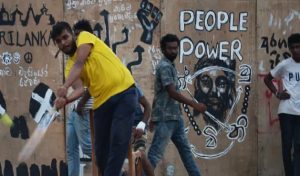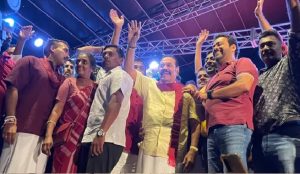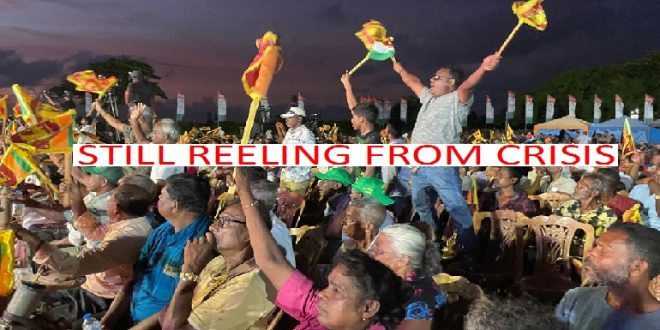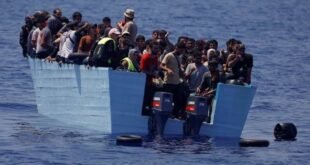19-09-2024
COLOMBO: “I thought I’d spend my whole life here, fighting a corrupt government but the younger generation did something.”
Samadhi Paramitha Brahmananayake is looking at the field where she spent months camped out with thousands of other demonstrators in Sri Lanka’s capital in 2022.
 She can’t quite believe that luscious green grass has replaced the hundreds of protester tents that filled the field opposite the presidential secretariat.
She can’t quite believe that luscious green grass has replaced the hundreds of protester tents that filled the field opposite the presidential secretariat.
“I feel we’re now more energetic, more powerful,” says Brahmananayake, a 33-year-old banker based in Colombo.
Two years ago, huge crowds forced the country’s deeply unpopular leader from office now voters are just days away from choosing who they want for president.
It’s the first election since the mass protests called the “aragalaya”, Sinhalese for struggle which were sparked by Sri Lanka’s worst economic crisis. Inflation was at 70%. Basics like food, cooking gas and medicine were scarce.
Gotabaya Rajapaksa, the president at the time, and his government were blamed for the mess. He fled the country just before crowds stormed his residence. Euphoric protesters leapt into the presidential pool, taking victory laps.
Mithun Jayawardana, 28, was one of those swimmers. “It was awesome,” he said thinking back. Jobless, with no gas or electricity at home, he says he joined the aragalaya for a lark.
Today, he recognises how crucial the elections on Saturday are: “We need a president who is elected by the people. The people didn’t elect the current president.”
Ranil Wickremesinghe, the man who currently holds the job, was appointed to the position after Gotabaya Rajapaksa resigned. Wickremesinghe, who’s been tasked with steering Sri Lanka through a period of painful economic reform, is running for re-election as an independent.
He’s stood for president twice before but never succeeded, and his political future appears uncertain.
 Many associate Wickremesinghe with the Rajapaksas, a political dynasty who have dominated Sri Lankan politics for decades. Many blame them for the years of financial mismanagement that led to Sri Lanka’s economic woes.
Many associate Wickremesinghe with the Rajapaksas, a political dynasty who have dominated Sri Lankan politics for decades. Many blame them for the years of financial mismanagement that led to Sri Lanka’s economic woes.
Even the country’s top court ruled that Gotabaya Rajapaksa and his brother Mahinda, another former president, were among 13 former leaders responsible for the financial crisis.
Despite the political baggage that comes with the name, a Rajapaksa has entered the political fray in these elections, there are still places the family enjoys a lot of support.
One such district is just over an hour outside Colombo. Music, fireworks and the cheers of supporters greeted Namal Rajapaksa as he approached the podium to address the hundreds that had come to hear him speak on Monday in the town of Minuwangoda. Even his father, Mahinda joined him on stage.
Namal Rajapaksa denied his family’s role in Sri Lanka’s economic collapse.
“We know our hands are clean, we know we have not done anything wrong to the people or this country,” he told media.
“We are willing to face the people, let the public decide what they want and who to vote for.” In all, a record 38 candidates are contesting the 21 September election, none of them women. In 2019, Sajid Premadasa, leader of the country’s main opposition party, won 42% of the popular vote, losing to Gotabaya Rajapaksa. This time around he is thought to be in with a chance too. (Int’l Monitoring Desk)
 Pressmediaofindia
Pressmediaofindia




